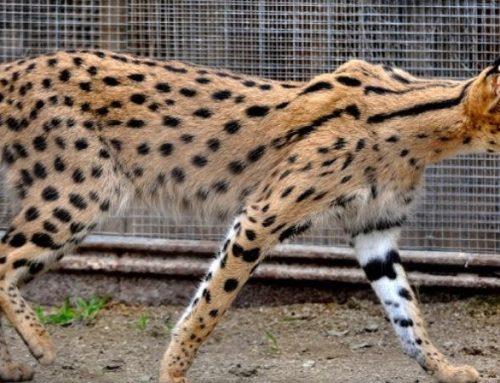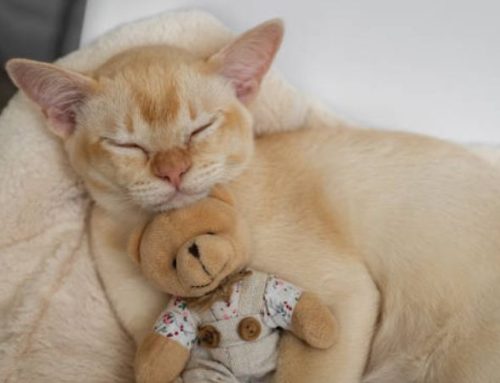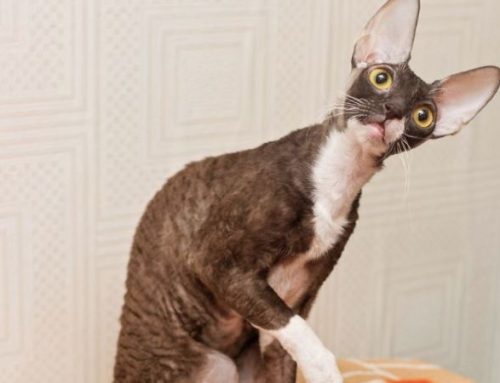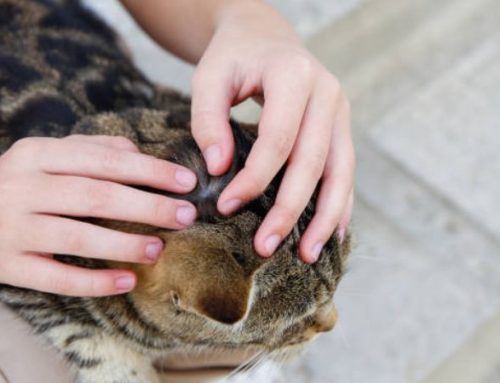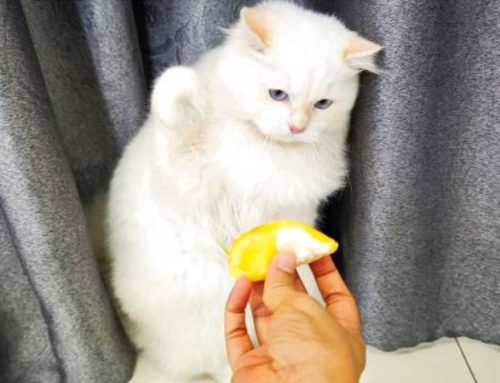Even small changes in a senior cat’s bathroom habits can signal more than just a minor upset. Diarrhea or vomiting in older cats often points to underlying health issues such as pancreatitis, hyperthyroidism, or stress. Stress can be triggered by a move, the introduction of a new pet, the loss of a companion, or other environmental changes.
Understanding the signs and knowing how to respond can make a big difference. Read on to learn about senior cat diarrhea and vomiting: common causes, home remedies, and when to seek veterinary care.

Common Causes of Diarrhea and Vomiting in Senior Cats
Diarrhea and vomiting in senior cats are often more than simple digestive upsets—they can signal underlying health issues that need attention. As cats age, their metabolism, immune system, and organ function change, making them more vulnerable to various conditions. Understanding the potential causes helps cat owners recognize warning signs and seek timely veterinary care.
1. Dietary Causes
- Sudden Food Changes: Abruptly switching cat food can upset the digestive system. A gradual transition over a week or more is recommended.
- Food Allergies or Intolerances: Older cats can develop sensitivities to common proteins (beef, chicken, fish) or grains (wheat, corn).
- Ingesting Spoiled or Toxic Substances: Spoiled food, human medications, or toxic plants can cause acute digestive issues.
2. Gastrointestinal Issues
- Inflammatory Bowel Disease (IBD): Chronic inflammation of the stomach and intestines may cause recurring diarrhea, vomiting, and weight loss.
- Pancreatitis: Inflammation of the pancreas can lead to nausea, vomiting, and abdominal discomfort.
- Intestinal Parasites: Parasites like Giardia, roundworms, or Tritrichomonas can irritate the digestive tract, especially in outdoor cats.
3. Metabolic and Systemic Conditions
- Kidney Disease: Chronic kidney problems can upset the balance of fluids and electrolytes, leading to vomiting and diarrhea.
- Hyperthyroidism: Overactive thyroid increases metabolism, often causing diarrhea, vomiting, and weight loss.
- Liver Disease: Hepatic disorders affect digestion and detoxification, sometimes causing gastrointestinal symptoms.
- Diabetes Complications: Poorly controlled diabetes can contribute to digestive upset, including vomiting and diarrhea.
4. Cancer in Older Cats
- Gastrointestinal Lymphoma and Other Tumors: Tumors in the digestive tract can lead to chronic vomiting, diarrhea, and weight loss. Early detection and veterinary intervention are critical.
5. Side Effects of Medication
- Long-term medications, including pain relievers (NSAIDs), thyroid treatments, or certain antibiotics, can irritate the gastrointestinal tract.
6. Stress and Environmental Factors
- Household Changes: Moving, new pets, or changes in routine can trigger stress-related digestive issues.
- Anxiety or Reduced Mobility: Stress, boredom, or limited mobility may contribute to over-grooming, irregular eating, and gastrointestinal upset.
Diarrhea and vomiting in senior cats can result from a variety of causes, ranging from minor dietary changes to serious systemic diseases. Observing your cat carefully, keeping a detailed record of symptoms, and seeking veterinary advice promptly are essential to maintaining your senior cat’s health and comfort.
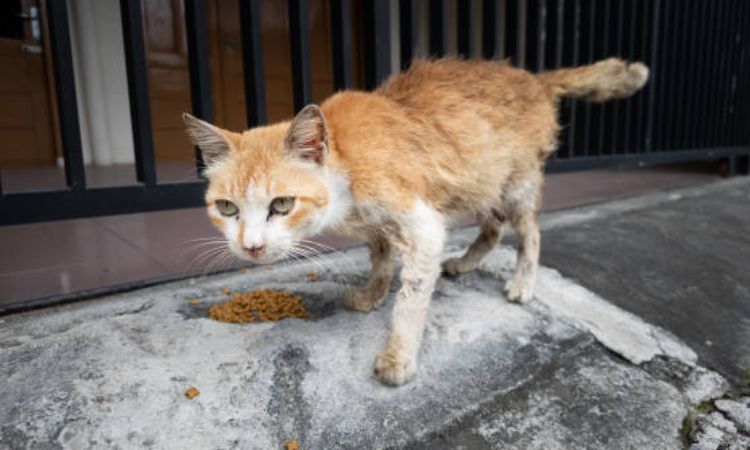
When Is It Serious? Red Flags to Watch For
Certain signs mean your senior cat’s diarrhea or vomiting may need urgent veterinary care:
- Dehydration: dry gums, sunken eyes, loss of skin elasticity, weakness
- Blood in stool or vomit: bright red (lower GI) or black/tarry (upper GI)
- Sudden weight loss or poor body condition
- Lethargy or weakness
- Chronic or worsening symptoms lasting more than 24–48 hours
- Refusal to eat for over 24 hours
Takeaway: Any of these signs warrants prompt veterinary evaluation to prevent complications and identify underlying causes.
Home Remedies and Supportive Care
Note: Home care can help manage mild diarrhea or vomiting, but veterinary guidance is essential to ensure safety and address underlying causes.
1. Dietary Adjustments
- Short-term food withholding: Temporarily withholding food for 12–24 hours can sometimes help settle the stomach. Water should always remain available. This should only be done under veterinary guidance, especially for kittens, elderly cats, or cats with chronic health conditions.
- Bland diet: Introduce easily digestible foods in small, frequent portions, such as:
- Boiled chicken or turkey (skinless, boneless)
- Plain rice or mashed pumpkin
- Vet-prescribed gastrointestinal diets (e.g., Hill’s i/d, Royal Canin Gastrointestinal, Purina Pro Plan EN Gastroenteric)
- Senior-specific or sensitive-stomach diets: Long-term dietary adjustments may be needed to prevent recurrence, including foods formulated for sensitive digestion, low fat, high fiber, or hypoallergenic ingredients. Gradually transition to new food by mixing with the old diet over several days to minimize digestive upset.
2. Hydration Support
- Encouraging water intake: Dehydration is a major risk during diarrhea or vomiting. Ensure fresh water is available at all times.
- Wet food: Feeding canned or semi-moist food increases water consumption naturally.
- Cat water fountains or flavored water: Flowing water or lightly flavored water can entice cats to drink more, supporting hydration and gut health.
3. Probiotics and Supplements
- Feline-specific probiotics: Can help restore gut flora and improve digestive health, particularly after diarrhea or antibiotic therapy. Always use products formulated for cats.
- Omega-3 fatty acids: Support gastrointestinal and immune health, reducing inflammation and promoting overall wellness. Supplements should be given under veterinary advice to ensure proper dosing.
4. Comfort and Environment
- Reduce stress: Stress can worsen gastrointestinal issues in senior cats. Minimize environmental changes, provide familiar routines, and limit exposure to stressful situations.
- Calm, warm resting areas: Ensure your cat has quiet, comfortable spaces to rest. Adequate sleep and a low-stress environment support recovery and overall health.
Key Reminder: While home remedies can support recovery, persistent, severe, or recurrent digestive issues require veterinary evaluation to rule out underlying illnesses such as kidney disease, hyperthyroidism, pancreatitis, infections, or gastrointestinal cancer.
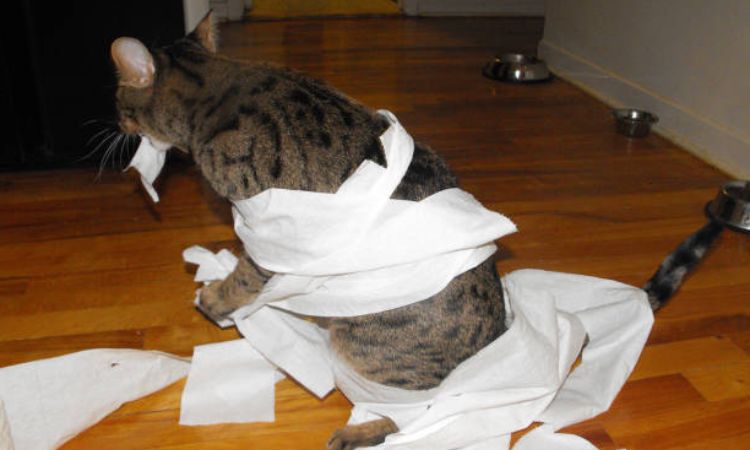
Prevention Tips for Senior Cat Digestion Health
1. Regular Veterinary Check-Ups
Routine veterinary visits are crucial for senior cats. Semi-annual check-ups help detect early signs of digestive issues, monitor underlying conditions such as kidney disease, hyperthyroidism, or inflammatory bowel disease, and allow your veterinarian to recommend dietary or medical interventions before problems escalate.
2. Gradual Diet Transitions
Senior cats can be sensitive to sudden dietary changes, which may trigger gastrointestinal upset. When introducing a new food—whether it’s a different flavor, brand, or prescription diet—transition gradually over 7–10 days. Start with a small proportion of the new food mixed with the old, increasing the new food each day until the transition is complete.
3. Parasite Prevention
Internal parasites, such as worms or protozoa, are a common cause of digestive disturbances. Even senior cats can be affected, particularly if they spend time outdoors. Year-round parasite prevention—including routine deworming and fecal testing—helps maintain gastrointestinal health and prevents recurring digestive issues.
4. Monitoring Litter Box Habits
Regular observation of your senior cat’s litter box is an important preventive measure. Changes in stool consistency, frequency, or appearance can indicate early digestive problems. Prompt attention to abnormal stools—such as diarrhea, blood, or unusual color—can prevent more serious complications and dehydration.
5. Consistent Feeding Routine
Maintaining a consistent feeding schedule helps support digestive regularity. Senior cats benefit from small, frequent meals rather than fewer large meals, which improves digestion and nutrient absorption. Providing a predictable feeding routine also reduces stress, which can negatively impact gastrointestinal health.
It’s tough to see your senior cat unwell, and while minor issues might resolve on their own, don’t hesitate to seek professional help. A simple call to your vet can provide peace of mind and ensure your cat gets the right care. Your quick action can make all the difference.


